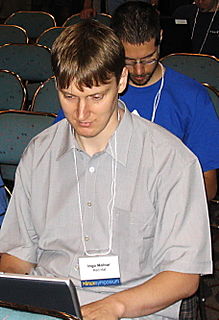A Quote by Lisa Gardner
Who do you love? It's a question anyone should be able to answer. A question that defines a life, creates a future, guides most minutes of one's days. Simple, elegant encompassing. Who do you love?
Related Quotes
Too many escape into complexity these days. For it is an escape for persons to cry, when this question of the equality of peoples is raised in India or in our own South, 'Ah, but the situation is not so simple.' ... no great stride forward is ever made for the individual or for the human race unless the complex situation is reduced to one simple question and its simple answer.
In the Marquette Lecture volume, I focus on the question in the title. I emphasize the social and political costs of being a Christian in the earliest centuries, and contend that many attempts to answer the question are banal. I don't attempt a full answer myself, but urge that scholars should take the question more seriously.
To be a scientist you have to be willing to live with uncertainty for a long time. Research scientists begin with a question and they take a decade or two to find an answer. Then the answer they get may not even answer the question they thought it would. You have to have a supple enough mind to be open to the possibility that the answer sometimes precedes the question itself.
The Work is four questions and a turnaround. The Work is a way to identify and question the thoughts that cause all the suffering and violence in the world. The Work is a very, very simple process. It's for anyone who can answer a question that is willing to. It takes a bit of willingness and an open mind.







































